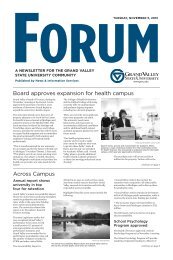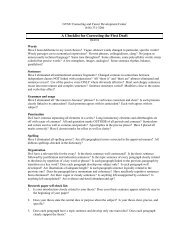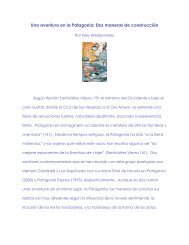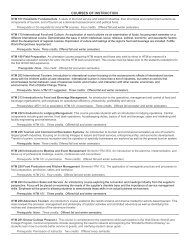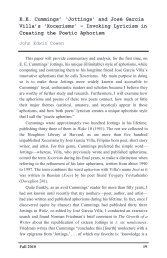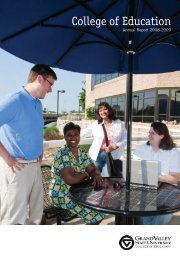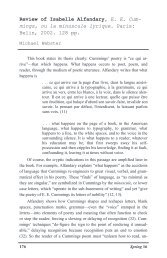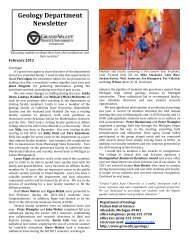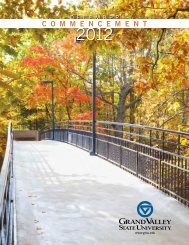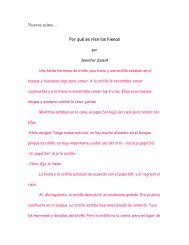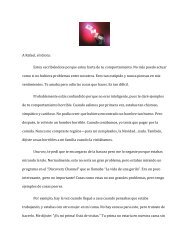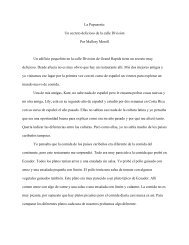Two Poets: John Tagliabue and Tony Quagliano In Memoriam John ...
Two Poets: John Tagliabue and Tony Quagliano In Memoriam John ...
Two Poets: John Tagliabue and Tony Quagliano In Memoriam John ...
Create successful ePaper yourself
Turn your PDF publications into a flip-book with our unique Google optimized e-Paper software.
<strong>Two</strong> <strong>Poets</strong>:<br />
<strong>John</strong> <strong>Tagliabue</strong> <strong>and</strong> <strong>Tony</strong> <strong>Quagliano</strong><br />
<strong>In</strong> <strong>Memoriam</strong> <strong>John</strong> <strong>Tagliabue</strong><br />
Grace <strong>Tagliabue</strong> wrote us on October 14, 2006:<br />
Fall 2006<br />
A week or so ago Spring 13 arrived <strong>and</strong> I realized I had neglected<br />
to notify you that <strong>John</strong> died on May 31st. He had been operated on<br />
for pancreatic cancer <strong>and</strong> due to complications did not survive.<br />
Needless to say, I suppose you can imagine the sad <strong>and</strong> confusing<br />
time it has been for his family. Just now I am beginning to try to<br />
deal with matters that should have been taken care of during the<br />
time of his hospitalization <strong>and</strong> after his death. It was devastating—<br />
a great upheaval—we had been married for almost 60 years.<br />
Sincerely,<br />
Grace <strong>Tagliabue</strong><br />
<strong>John</strong> <strong>Tagliabue</strong> was a much-loved teacher <strong>and</strong> colleague at Bates College<br />
in Lewiston, Maine. Professor Carole Ann Taylor wrote the following<br />
“Memorial Minute” for him:<br />
<strong>John</strong> A. <strong>Tagliabue</strong> Memorial Minute<br />
Carole Ann Taylor<br />
The traditional memorial minute was read at the Sept. 11, 2006, faculty<br />
meeting at Bates College by Carole Ann Taylor, Professor of English, for<br />
the late Professor Emeritus of English <strong>John</strong> A. <strong>Tagliabue</strong>.<br />
Source: http://www.bates.edu/x146167.xml<br />
For <strong>John</strong> <strong>Tagliabue</strong>, who devoted 36 years to Bates as teacher,<br />
colleague, friend, raconteur <strong>and</strong> poet laureate, neither a memorial minute,<br />
nor even two voices, begins to suffice. Everyone who knew him has their<br />
favorite <strong>John</strong> stories, inadequately represented here. But we hope you'll<br />
indulge us in rather more than a minute <strong>and</strong> remember this renowned<br />
American poet by reading his poems again or for the first time.<br />
<strong>John</strong> was born in Cantu, Italy, in 1923, to a restaurateur father<br />
who encouraged <strong>John</strong> to dance for customers <strong>and</strong> a mother whose wit as a<br />
69
storyteller, even in advanced age in Lewiston, helped to explain the phenomenon<br />
of <strong>John</strong>. He received a B.A. <strong>and</strong> an M.A. from Columbia University,<br />
where he became a lifelong friend of Allen Ginsberg <strong>and</strong> knew such<br />
countercultural icons as William Burroughs <strong>and</strong> Jack Kerouac.<br />
But <strong>John</strong> preferred celebration even then, hung out with dancers,<br />
<strong>and</strong>, in 1946, married his life-partner Grace, a visual artist <strong>and</strong> fellow visionary<br />
whose glad kindness, it did not take a poet to recognize, warrants<br />
her name. He would teach in Beirut <strong>and</strong> several other places before coming<br />
to Bates in 1953, at a time when he was expected to get President Charles<br />
Phillips' approval for any poems that he read or published. During the<br />
McCarthy era, at a time when faculty of color were few <strong>and</strong> far between<br />
<strong>and</strong> gay faculty knew that to be outed would mean summary dismissal, no<br />
doubt <strong>John</strong>'s <strong>and</strong> Grace's support of civil rights, gay rights <strong>and</strong> the anti-war<br />
<strong>and</strong> anti-nuclear movements seemed to some dubious engagements. But<br />
with extraordinary charm to assist him, <strong>John</strong> negotiated this terrain by enriching<br />
<strong>and</strong> subverting simultaneously, with such liberatory <strong>and</strong> allusive<br />
poetic reference that a censor never stood a chance.<br />
By the time I arrived in the late '70s, his merged poetic <strong>and</strong> institutional<br />
personae had become so artful that I would have to learn that his<br />
studiously ethereal persona disguised a selective but extremely wellorganized<br />
competence. (He wrote: “Does any one mail more mail than I<br />
do? / I don't think so: not even Sears Roebuck, / not even seals spouting on<br />
their way to one / of their favorite really pleasurable resorts do....”) His<br />
colleague of the time Bud Rovett tells a story of walking across the Quad<br />
with <strong>John</strong> <strong>and</strong> running into President Phillips, for whom <strong>John</strong> performed a<br />
spontaneously hyperbolic encomium to the spring, the birds <strong>and</strong> the character<br />
of infinite wonder until the President managed his formal departure <strong>and</strong><br />
<strong>John</strong> turned to his friend <strong>and</strong> said, “Well, no more committees for another<br />
year.”<br />
And yet, on his own terms, he gave unstintingly generous gifts to<br />
the College. Among Bates‟s many wonderful teachers, probably no one has<br />
been more often invoked or remembered as legendary while still alive, <strong>and</strong><br />
nobody could match <strong>John</strong> for how well he kept in touch with former students<br />
all over the world. <strong>John</strong>'s pedagogy, which relied on inspired preparation,<br />
involved arriving early to cover the blackboard with brilliantly diverse<br />
<strong>and</strong> relevant quotations, the excitement of crosscultural connections in<br />
graphic juxtaposition. Becoming what he was doing, he would arrive in<br />
black to teach Hamlet or in a bright multicolored striped sweater to talk<br />
70 Spring 14-15
about Shakespearean fools. An avid <strong>and</strong> perceptive world traveler who had<br />
six Fulbrights, he taught in Greece, Spain, Brazil, Italy, Japan <strong>and</strong> the People's<br />
Republic of China; <strong>and</strong> at Bates, he was the first to teach Asian <strong>and</strong><br />
other world literatures beyond the European. And, of course, he acted as<br />
the first mentor for many who became littérateurs in their own right. He<br />
saw his task clearly: to foster a love of literature so intense that it would<br />
last his students‟ lifetimes. Appropriately, they found him “Buddhaesque,”<br />
full of spiritually informed laughter <strong>and</strong> wisdom (my son was sure that<br />
whoever designed Yoda must have known <strong>John</strong> first). And abundant testimony<br />
suggests that he never failed to enact what he taught in a pedagogy at<br />
once lyrical, dramatic <strong>and</strong> utopian in its energies.<br />
I'll offer here just a couple of comments from a memorial Web site<br />
started by Richard Carlson that also includes some of <strong>John</strong>'s last poems <strong>and</strong><br />
correspondence, <strong>and</strong> hope it will suggest the character of his effect on students.<br />
<strong>John</strong> Holt wrote: “He was the Sage of Lewiston <strong>and</strong> the light that<br />
woke us up.... He was the Buddha Uproar at dawn on Mount David,<br />
masked dancer, Dionysian spirit, Vishnu by the Androscoggin.” And Diane<br />
Davies speaks for many: “...the world needs to hear more of his work.<br />
Those of us who knew <strong>and</strong> loved him were very lucky indeed. It is shocking,<br />
like he used to say the death of Mercutio was shocking, to see so much<br />
vitality snuffed out forever. So that he may not wholly die then, do what<br />
you can to keep his poetry alive.”<br />
As colleague, that vitality brought us all daily delight. <strong>John</strong>'s early<br />
rounds made poems appear on our doors before we arrived, often geared<br />
specifically to us. If you'd given him a weird-shaped potato from your garden,<br />
say, by the following day it might become the Willendorf Venus making<br />
out with Wittgenstein. He involved us in the annual United Nations of<br />
Poetry in his living room, where students <strong>and</strong> teachers alike brought <strong>and</strong><br />
read poetry across the cultures, as well as in such rich imaginative productions<br />
as the fantastical Mario Puppet Plays. Always the singer of praise<br />
songs for humble moments or great thinkers, he treated literary, cultural<br />
discussions with anyone as worthy of the highest seriousness. And since he<br />
celebrated his colleagues, friends <strong>and</strong> students with the same effusive glee<br />
that springs from his poems (indeed, often in the poems), he made us all<br />
want to live up to such high description.<br />
The first four volumes of poetry—Poems (1950); A Japanese<br />
Journal (1966); The Buddha Uproar (1970); <strong>and</strong> The Doorless Door<br />
(1970)—preceded two later collections ranging over many years, The Great<br />
Fall 2006<br />
71
Day: Poems, 1962-1983, <strong>and</strong> New <strong>and</strong> Selected Poems: 1942-1997. Those<br />
lauding <strong>John</strong> as a poet read like a Who's Who in American poetry, including<br />
Gwendolyn Brooks (“a shrewd c<strong>and</strong>or that includes beauty, music <strong>and</strong><br />
an exciting energy”); Hayden Carruth (“a thread of sanity in the general<br />
murk, a constant music”); <strong>John</strong> Ciardi (“like common daylight coruscating<br />
through a prism”); Amy Clampit (“a Franciscan act of courtesy <strong>and</strong><br />
praise”); Denise Levertov (“profuse <strong>and</strong> various, combin[ing] innocence<br />
<strong>and</strong> knowledge in an unique way”); <strong>and</strong> X. J. Kennedy, who called him<br />
“the Shelleyan colossus of the North.” Locally, <strong>John</strong> mined the Bates world<br />
for lyrical incentives <strong>and</strong> always surprised, from “Highest Honors; coolness<br />
breeze” to my favorite, the poem called “To Dedicate a Library,” read on<br />
the inauguration of Ladd Library. Several talk of reviving the puppet plays,<br />
<strong>and</strong> you may now see some of Grace's miraculous puppets on display in<br />
Ladd. <strong>John</strong>'s poetic stature continues to grow, <strong>and</strong> Syracuse University has<br />
archived his notebooks, journals <strong>and</strong> correspondence.<br />
When poets came to visit, <strong>John</strong> frequently introduced them with a<br />
praise-poem of his own, so it's most fitting that Rob perform that function<br />
here. But because <strong>John</strong> was so fond of the luminous detail, I want to end<br />
with a personal image of <strong>John</strong>, who, although Grace grew gorgeous flowers,<br />
was in much too intimate communion with nature to own a lawnmower.<br />
Nevertheless, when a neighbor mentioned that <strong>John</strong>'s unkempt<br />
grass was spilling through the fence, he took Grace's largest scissors <strong>and</strong><br />
plopped himself down in sundry spots to cut concentric circles around himself,<br />
producing a temple-like configuration of these stunningly mystical<br />
donuts. So we, too, should “weave a circle around him thrice” (Kubla<br />
Khan), because he has “drunk the milk of paradise,” <strong>and</strong> be grateful, in his<br />
words, that:<br />
moment by moment we were<br />
granted all this<br />
verbal eternity.<br />
Letter from <strong>John</strong> <strong>Tagliabue</strong>, August 9, 2005<br />
—Bates College, Lewiston, Maine<br />
I‟ve always had much affection & admiration for the work of E. E. Cummings.<br />
That‟s been a long good fortune; it startles me to think that I am<br />
now beyond age 82! From the time I was a young Columbia College stu-<br />
72 Spring 14-15
dent in NYC when Mark Van Doren was my most helpful teacher <strong>and</strong><br />
when I knew José García Villa, a young poet then (1941-45) <strong>and</strong> great admirer<br />
of Cummings, I‟ve been entertained <strong>and</strong> educated by Cummings‟<br />
poems & his six nonlectures & so on.<br />
Glad to get your notes about Spring a few days ago. Back a year<br />
ago—in August 2004—I received a farewell letter from Norman Friedman.<br />
I hope he is well. He had written a good essay for Spring relating Cummings<br />
& my poems; <strong>and</strong> Spring had published my poems often; Norman<br />
said he was giving you a group of poems I sent him. I‟ve been wondering<br />
what‟s been happening to the magic [?]--& to those poems of mine. What<br />
are the plans with them.<br />
Visitors just arrived—so I‟ll write more to you after hearing from<br />
you. You have all my best wishes in your new work devoted to a poet we<br />
much admire. I think that I sent another poem for Spring back in November<br />
2004.<br />
from the Providence Notebook [Summer, 2005]<br />
<strong>John</strong> <strong>Tagliabue</strong><br />
Fall 2006<br />
*<br />
I never want my poems to be a cause or subject for school arguments,<br />
<strong>and</strong> certainly not arguments with friends.<br />
I write <strong>and</strong> I write <strong>and</strong> that‟s that. And the consequences <strong>and</strong> the<br />
business related to that I don’t know about. May the poems make many<br />
editors <strong>and</strong> readers often inspired <strong>and</strong> helped <strong>and</strong> merry. And that‟s that.<br />
The poem controls me, <strong>and</strong> I somewhat control it in the act of writing. I‟m<br />
thankful. As Falstaff said - “<strong>In</strong>stinct is a great matter.” And fame?? some of<br />
my poems in ways said some things inspired about that.<br />
Among many others I‟ve enjoyed, learned from, the poems of E.<br />
E. Cummings, Rimbaud, Apollinaire. Re-read Cummings‟ 6 nonlectures.<br />
Form, shape, in art <strong>and</strong> poetry are part of “meaning” <strong>and</strong> entertainment;<br />
those poets <strong>and</strong> I don’t want the shape of our poems changed. Much could<br />
be discussed concerning all this <strong>and</strong> that could sometimes be interesting.<br />
But I prefer to walk, dance, write poems rather than have Critical Discussions.<br />
So ? On with the show. And may you be entertained <strong>and</strong> happy.<br />
*<br />
I‟m not saying it‟s a bad pastime Showing Appreciation, even<br />
73
stylizing that; I did plenty of that from 1945 to „89 in classes. That at times<br />
was entertaining.<br />
You‟ve come to terms with a big book, you‟ve sort of wrestled<br />
with an angel now by age 82 you‟ve turned a million pages, more, you‟ve<br />
been emotional at different stages, some rage against the dying of the light,<br />
some zen laugh all along at what you call right <strong>and</strong> wrong. A friend has a<br />
vast philosophic sense of history until he begins to forget names of friends,<br />
names of uncles <strong>and</strong> epochs. Everything we knew grows old but everything<br />
we know is new. Some days you like it; some days you don‟t <strong>and</strong> say so<br />
what ? Home is everywhere for Puck <strong>and</strong> Lear <strong>and</strong> charity begins at home;<br />
seeking improvements you sometimes come to plateaus of platitudes. Sighing<br />
or laughing you approve of loving others <strong>and</strong> go to bed. Old or young<br />
you persist in repeating, at least in hoping, home is a place for love. You‟ll<br />
even go as far as Dante, agree with him — “love moves the sun <strong>and</strong> other<br />
stars.”<br />
*<br />
EMERSON: “As I am, so I see, use what language we will, we can never<br />
say anything but what we are.”<br />
With instincts for realisms <strong>and</strong> hope<br />
*<br />
I hope I come / I hope you come / not when irritable or confused / but when<br />
generously good <strong>and</strong> ready <strong>and</strong> welcoming / each other lightly casually<br />
surprisingly very appreciatively / with freshness very good <strong>and</strong> ready.<br />
Advice to myself. If you forget your zen /<br />
then don‟t forget / your taoism.<br />
Robert Farnsworth's Reading of a <strong>Tagliabue</strong> Poem<br />
+<br />
At the September 2006 faculty meeting, English faculty member<br />
Rob Farnsworth, who spent the summer as the poet-in-residence at The<br />
Frost Place, a museum <strong>and</strong> arts center housed in poet Robert Frost's former<br />
homestead in Franconia, N.H., read a poem of his own in memory of <strong>John</strong><br />
<strong>Tagliabue</strong> as well as this poem of <strong>Tagliabue</strong>'s, “Sliding into the Future”:<br />
Source: http://www.bates.edu/x149922.xml<br />
74 Spring 14-15
Fall 2006<br />
Sliding <strong>In</strong>to the Future<br />
Achieving?<br />
What is there to achieve? The event occurs at its<br />
own accord<br />
as the sea shell is made or the volcano erupts<br />
or the lines<br />
of a Shakespeare play are memorized; in due time<br />
It Happens<br />
momentously temporarily, the snow cap melts,<br />
the sea anemone<br />
blossoms, the lizard‟s shadow is sketched in the<br />
memory.<br />
The anguish in the sick bed is engraved on<br />
the foam.<br />
Forms keep changing; clouds as much as deities;<br />
<strong>and</strong> Zeus<br />
is bewildered, transformed. The opulent is found<br />
or lost in<br />
the twinkling of an eye. Someone performs a<br />
ritual in shadows.<br />
The lover leaves his bed; none knows what will<br />
happen next.<br />
Achievements flare up like the flames of orange moths<br />
on Paros.<br />
Faces keep appearing from the distant past. Boats appear<br />
with cargoes never seen before.<br />
— <strong>John</strong> <strong>Tagliabue</strong><br />
75
Let us remember<br />
<strong>John</strong> <strong>Tagliabue</strong> 1923-2006<br />
The look <strong>and</strong> book of truth can never be unfaithful<br />
Now it‟s not the first time that<br />
I see angels<br />
I mean snowflakes<br />
or that I hear music<br />
born out of what seems<br />
silence but it is the<br />
most necessary ( is that<br />
easy? ) fact in the<br />
fabulous world of<br />
changing events that<br />
renewal is the law<br />
of Providence,<br />
It occurs in strange <strong>and</strong> at times difficult <strong>and</strong> painful<br />
ways, death, loss of<br />
faith; but as I see<br />
all these minute<br />
snowflakes in the grey<br />
Maine day which I<br />
cannot count any more than St. Thomas could the<br />
angels on a pin‟s head<br />
I am conscious of a quiet newness that I<br />
declare a cool <strong>and</strong> refreshing<br />
in some ways undecipherable<br />
new testament.<br />
—Providence, RI<br />
76 Spring 14-15



